Shopify vs GoDaddy is frankly a fierce battle for merchants to choose when building an online store or a personal site. Both Shopify and GoDaddy are beginner-friendly, suited for specific sorts of websites, and supported by a slew of supplementary features. Therefore, choosing the most-suited platform might be a tough call.
In this article, LitExtension – #1 Shopping Cart Migration Expert will compare these platforms in detail to help you determine which is your go-to solution. Those will include what Shopify and GoDaddy can do, which one is better suitable for your business.
Keep reading to get:
- An overview of Shopify vs GoDaddy
- Shopify vs GoDaddy: In-depth Comparison
- GoDaddy vs Shopify: Which should you use?
- Alternatives to Shopify and GoDaddy
Brief Overview of Shopify vs GoDaddy
Shopify stands out as an eCommerce-centric website creation tool. It’s celebrated for its user-friendly interface, customizable options, and comprehensive features. These potentially make it the leading eCommerce platform currently available.
When you’re considering Shopify, understanding its pros and cons is crucial. Let’s delve into them right below:
Pros | Cons |
|
|
Meanwhile, GoDaddy, a well-known entity in website creation, debuted its website building and hosting solutions in the late 1990s. Although it’s not exclusively focused on eCommerce like Shopify, GoDaddy offers the capability to integrate an online store into a website with specific plans.
Pros | Cons |
|
|
Understanding the difference between GoDaddy and Shopify can be challenging. To make it easier for you, we’ve created a quick comparison table and then an in-depth comparison to underscore which is better Shopify or Godaddy.
Features | Shopify | GoDaddy | Winner |
Pricing | Offers 3 standard plans | Offers 1 Commerce plan for eCommerce stores | Shopify (more flexibility) |
Ease of Use | Drag-and-drop design, beginner-friendly | AI-powered builder tool that can speed up the website creation process | GoDaddy (faster setup) |
Page Speed | Fast | Fast | A tie |
Theme & Customization | Over 190 mobile-responsive themes and high customization freedom thanks to Shopify Liquid | About 200 theme options, less customization | Shopify (more creative control) |
App Store | Bustling marketplace with over 8,000 apps (both free and paid) | Not offering a traditional third-party extension marketplace But having alternatives for eCommerce functionality, such as website builder add-ons | Shopify (higher flexibility) |
Ecommerce Tools & Features | Robust selection of sales tools, marketing features, app integrations, and shipping options | Basic eCommerce tools like product listing and management, limited marketing features, few app integrations, and limited shipping | Shopify (more powerful sales features) |
Marketing Capabilities | Email marketing, blogging, integration with other marketing tools | Strong email marketing, basic blogging, internal SEO management | A tie |
Internationalization | Supports multi-languages, local currency conversion, automatic tax calculation | No multi-language support, currency conversion through integrations (clunky), manual tax setup | Shopify (superior internationalization features) |
Pricing
Before you dive into creating your website, it’s important to figure out how much you can spend and what you need. Make sure the plan you pick between GoDaddy vs Shopify is worth your money.
Shopify Pricing
When it comes to Shopify pricing, it offers a 3-day free trial, with the option to extend it for an additional 30 days by paying a one-time fee of $1. After that, you will need to choose a paid plan at the regular price. It offers 3 standard plans:
- Basic Shopify: At $39/month
- Shopify: At $105/month
- Advanced Shopify: At $399/month
More specifically, the Basic, Shopify, and Advanced plans offer all the essential features that merchants require for their online stores. Here they are:
Basic Shopify $39/month | Shopify $65/month | Advanced Shopify $399/month | |
Transaction Fees *if not using Shopify Payments | 2.9% + 30¢ USD online 2.6% + 10¢ USD in person 2% 3rd-party payment providers | 2.7% + 30¢ USD online 2.5% + 10¢ USD in person 1% 3rd-party payment providers | 2.5% + 30¢ USD online 2.4% + 10¢ USD in person 0.6% 3rd-party payment providers |
Additional staff accounts *assign & manage staff's activities | — | 5 | 15 |
Custom apps | Standard | API PII access included | API PII access included |
Checkout capacity *automatically manage & operate stores | Standard | Standard | 10x |
Shipping Discount *shipping subsidies with leading carriers | up to 77% | up to 88% | up to 88% |
Duties and import taxes | — | — | fully supported |
Localized selling with custom markets | 3 markets | 3 markets | 3 included + $59/mo per added active market |
Please note that larger eCommerce businesses may find the Shopify Plus plan more suitable. It caters to corporate users, offering additional security, API access, and CRM integration. Notable companies like Whole Foods Market, Polaroid, and Red Bull have adopted Shopify Plus as their eCommerce solution.
GoDaddy pricing
How do GoDaddy vs Shopify compare in terms of pricing? GoDaddy comes with 4 pricing plans based on the features you opt for:
- Basic – For getting started: 12.99$/month
- Standard – For brand building: 16.99$/month
- Premium – For more flexibility: 22.99$/month
- eCommerce – For scalability and automation: 26.99$/month
All plans allow you to create a customizable website, with user-friendly themes and templates. Within each plan, users can customize their site and create branded content. The management dashboard is straightforward and easy to use. However, we hope you know that only the Commerce plan allows you to set up an eCommerce store.
Comparing GoDaddy vs Shopify, you can learn that Shopify wins here. Shopify’s robust sales-specific capabilities make it an excellent value for eCommerce businesses aiming to grow.
Ease of Use
Nobody likes to spend too much time on a tough platform when building a website. In this section, let’s see if Shopify and GoDaddy can save time and effort with their user-friendliness.

Shopify is a sensible choice that’s easy to navigate. Its drag-and-drop feature lets you customize designs fast and without hassle.
This platform might be a bit trickier than GoDaddy. But, it gives you more creative control and consistency in branding. This means you can design your website exactly how you want it to look, creating a polished and unified brand image that many businesses find attractive.

Now you might ask, is GoDaddy better than Shopify when it comes to simplicity? Indeed, GoDaddy is top-notch in this regard. Just answer some questions, and there you are, you get a website ready in no time. It’s a real time-saver.
The trade-off? GoDaddy’s simplicity means you can’t tweak designs as much as you might want to when setting up an online store.
The verdict:
GoDaddy wins as it’s the go-to for a quick and straightforward website setup, provided you’re okay with some design constraints. It’s surprisingly easy and fast. For those who know their way around websites, Shopify’s flexibility and advanced options are likely more appealing, even if it takes a bit more time to get things just right.
Page Speed (Performance)
Both Shopify and GoDaddy give top importance to how fast their websites run. Shopify hones in on making apps and themes work better. Meanwhile, GoDaddy focuses on content delivery networks, upkeep, and making the best use of resources.
Here’s an important comparison between GoDaddy vs Shopify.
Shopify Page Speed
- Focus: Making apps and themes more efficient
- Tools: Google Lighthouse, PageSpeed Insights
- Strategies: Streamlining apps, refining themes
- Load times: Can vary a lot depending on how well it’s optimized
- Speed scores: Change based on apps and images used
- Improving core web vitals: Aiming to better LCP, FID, CLS
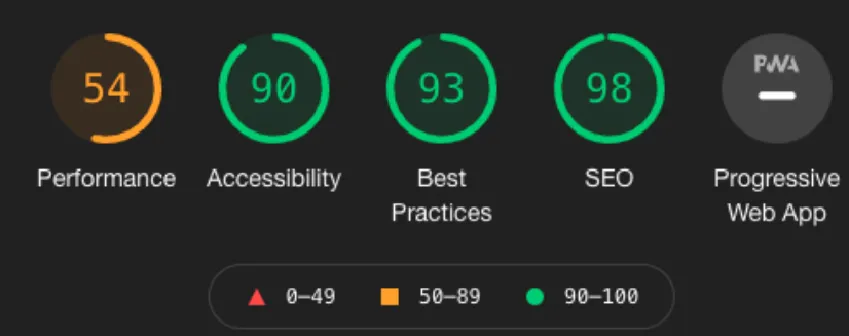
Shopify’s site performance is quick and it can still be quicker with Shopify page speed performance strategies. Be aware that if your site speed and page performance are decent, they boost your site’s SEO, then enhance the user experience (UX). After all, they advance your search engine rankings.
Want to migrate to Shopify?
If you are intending to migrate from GoDaddy to Shopify, LitExtension offers a great migration service that helps you transfer your data from the current eCommerce platform to a new one accurately, painlessly with utmost security.
GoDaddy Page Speed
- Focus: CDN, regular maintenance, resource management
- Tools: Integrated with Google PageSpeed Insights
- Strategies: CDN, upkeep, resource management
- Load times: Shared Hosting: 2-4s, VPS Hosting: 1-2s, Dedicated Server: 0.5-1.5s
- Speed scores: Shared Hosting: 50-70, VPS Hosting: 70-85, Dedicated Server: 80-95
- Improving core web vitals: Upgrading infrastructure, caching, optimizing images, minifying code, and using efficient templates and code for rendering
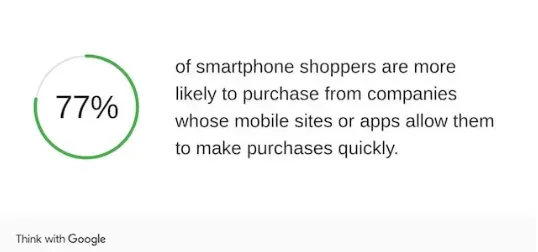
GoDaddy also prioritizes website speed and performance. They’ve made their platform faster with better servers and data centers. They also use caching, image tools, and code minification to make the user experience smoother and improve Core web vital metrics. Their website builder is designed for efficient performance, which helps overall.
The verdict:
Both Shopify and GoDaddy come out on top in this matchup. With such strong performance, page speed isn’t a concern with either Shopify or GoDaddy.
Themes, Design & Customizability
If you’re new to website design, you’ll likely want an eCommerce platform that provides straightforward, professional-looking templates and themes. Conversely, seasoned web designers might prefer a platform that allows for coding, giving them the freedom to infuse their unique style.
Then, how GoDaddy vs Shopify are in this competition? Both of them have design tools that accommodate both beginners and those with more experience in web design.
Themes and Design
Shopify stands out in the eCommerce space with over 190 stylish themes, including 13 free ones, available in its theme store. We’ve put together a list of the top 30 best Shopify themes to help you find the right fit for your shop.

Function-wise, many popular Shopify themes boast a product zoom feature for a better shopping experience and a shopping cart icon for convenience, making them user-friendly and easy to tailor.
Shopify themesIn comparison, GoDaddy utilizes an AI-powered mechanism. It can craft over 1,500 types of industry-specific sites and offers about 200 storefront themes. But once your site is up, your creative control might be limited.
Both platforms offer mobile-responsive themes, ensuring your store looks great on any device.
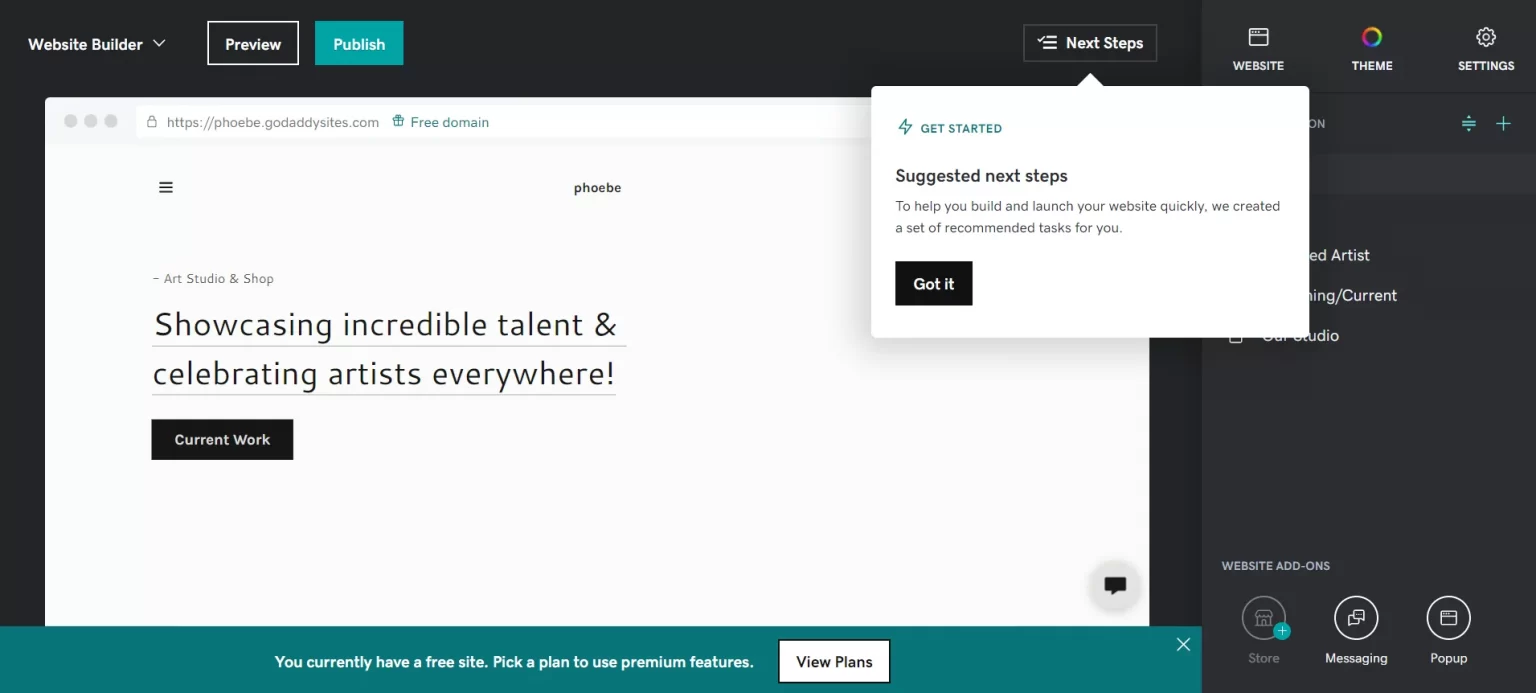
GoDaddy Website TemplateLastly, smartphone responsive themes are available on both platforms. This means your online store will resize to fit any screen size, ensuring good display on all devices.
Customizability
When it comes to design features, what is the difference between GoDaddy vs Shopify?
While Shopify's drag-and-drop editor makes adding content and media a breeze, its themes are separate from the content itself. This can be a challenge for beginners, but it also opens up endless design possibilities with a little CSS/HTML or Shopify Liquid knowledge.
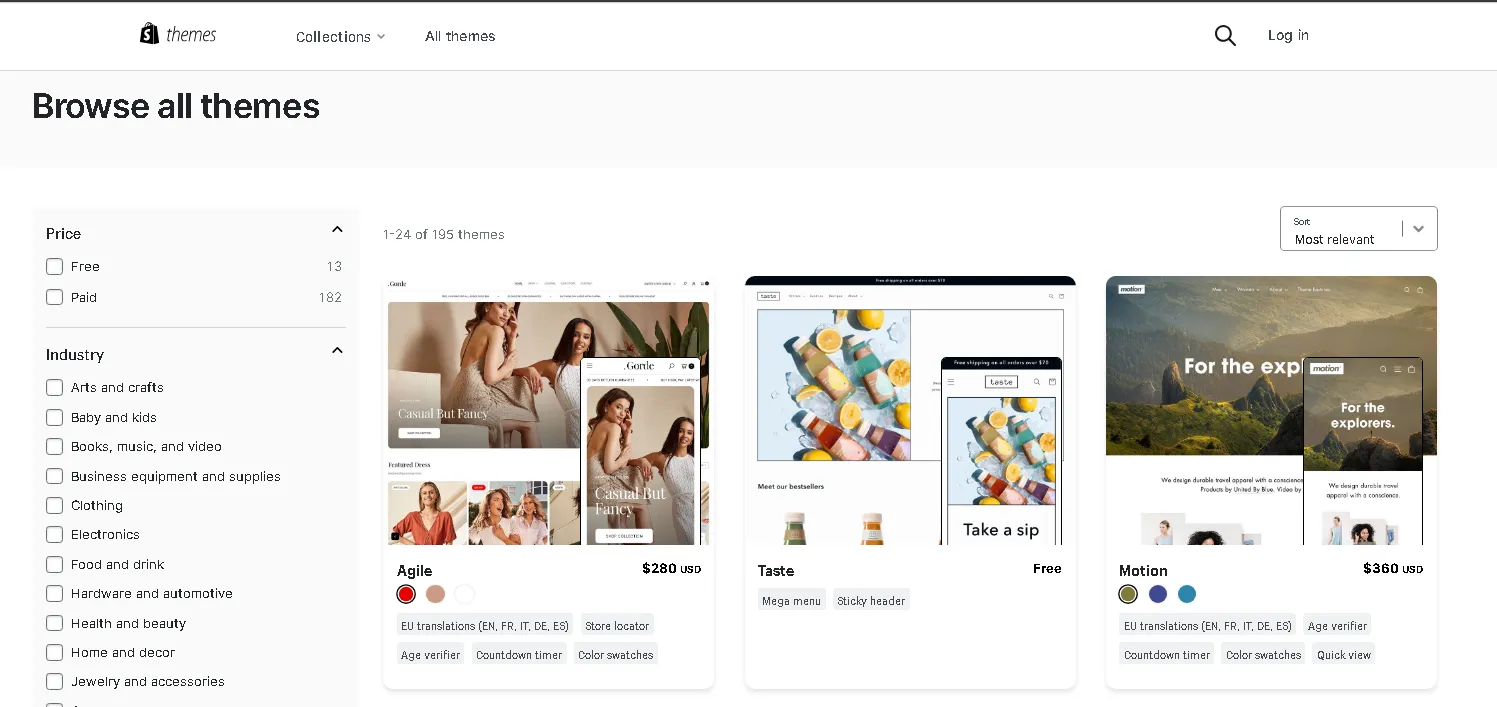
Shopify’s theme library includes numerous free and paid options, all responsive by default. Premium themes cost between $140 to $400, but even the free ones are impressive.
On the other hand, GoDaddy aims for simplicity in site-building, reflected in its less customizable templates.

GoDaddy’s builder offers plenty of ready-made themes for various website ideas. However, it lacks drag-and-drop editing, and you can’t tweak pages with HTML or CSS, so design alterations are limited.
The verdict:
Shopify wins since it offers more creative leeway with its array of customizable themes, complete with features like product zoom and cart icons to boost sales. GoDaddy’s ADI sets up your site for you, which means less room for personal touches. So, between the GoDaddy website vs Shopify, which one do you lean towards?
App Store
Which wins between GoDaddy vs Shopify in this battle? In fact, both of them offer mobile apps that have received excellent reviews in the Apple App and Google Play store.
Shopify’s app marketplace is bustling with over 8,000 apps, offering a wealth of customization options. Plus, with more than half of apps being free, starting your business won’t come with unexpected costs. The variety of apps covers everything from inventory and shipping to sales and conversions, all designed to streamline your online store’s operations and boost both traffic and sales.
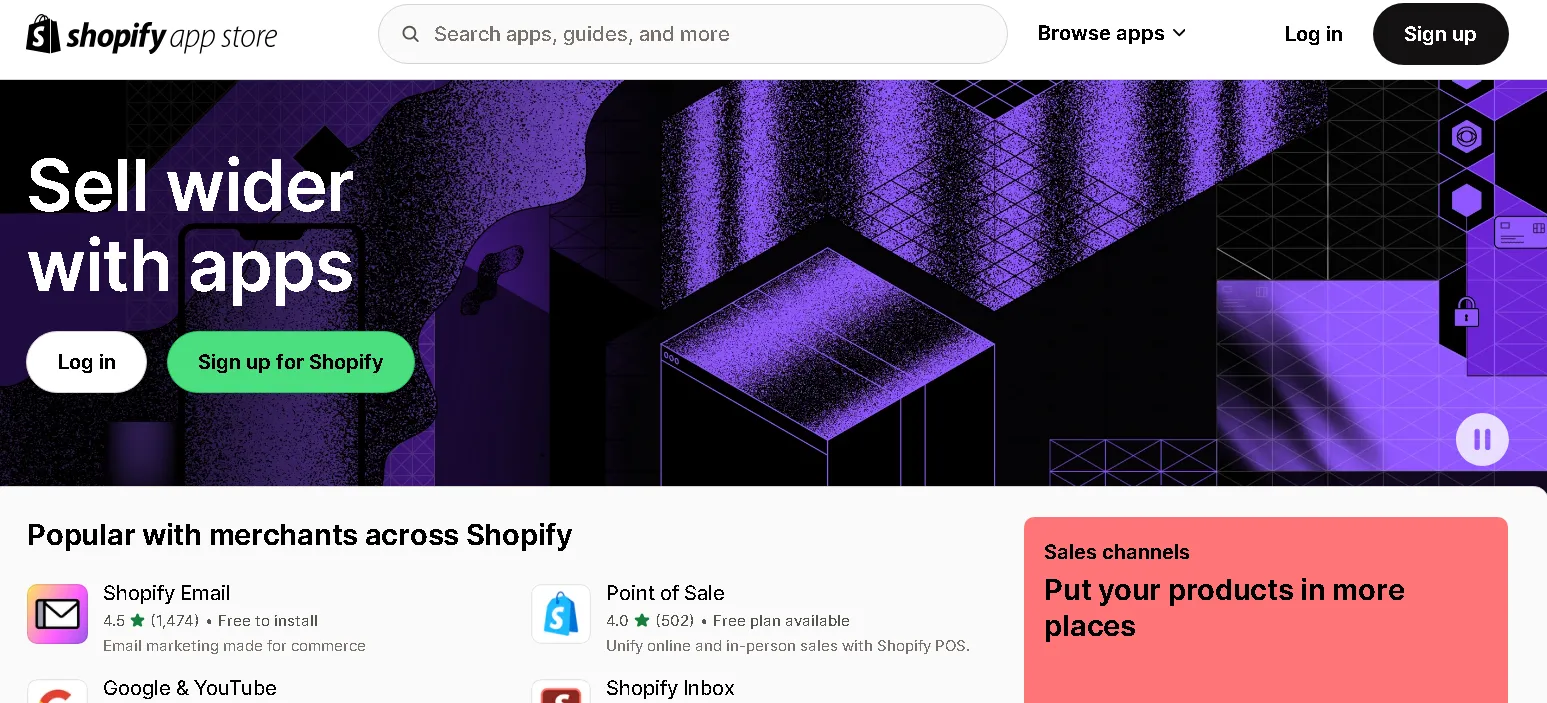
How about GoDaddy vs Shopify in terms of app store? GoDaddy doesn't offer a traditional marketplace for third-party extensions like Shopify's app store.
The verdict:
Shopify wins here. Its vast app marketplace offers extensive functions that can further enhance your business.
eCommerce Tools & Features
Every online store requires eCommerce capabilities to sell products through various channels and integrate with social media platforms. It’s crucial to choose a web host that provides the necessary eCommerce tools to build a thriving website.
Inventory Management
First, let’s talk about stock control. GoDaddy vs Shopify: Which wins in this competition?
Shopify's inventory management system allows for centralized order management. The POS (Point-of-sale) integration allows you to effortlessly oversee your digital and physical stock from a single, accessible spot. You can swiftly ascertain your current inventory levels and review past stock records with minimal effort. Moreover, it facilitates seamless connectivity with accounting systems, allowing you to monitor your financial gains effectively.
Shopify also includes advanced analytics, known as ABC analytics. This helps you make informed decisions about which products to stock, reorder, and eliminate based on sales performance.
Overall, this platform's inventory management capabilities are better suited for businesses that require more complex and detailed inventory management, particularly those with multiple fulfillment locations or a large product catalog.
In contrast, GoDaddy's inventory tracking is more suitable for small businesses with a limited number of products. Its inventory tracker automatically updates inventory levels when an order is placed, but it lacks the advanced analytics and fulfillment capabilities offered by Shopify.
GoDaddy does allow users to connect their product catalog to various marketplaces like Amazon, eBay, Etsy, Walmart, Facebook, and Instagram, with orders and inventory syncing automatically. Yet, its inventory management features are not as robust as those of Shopify.
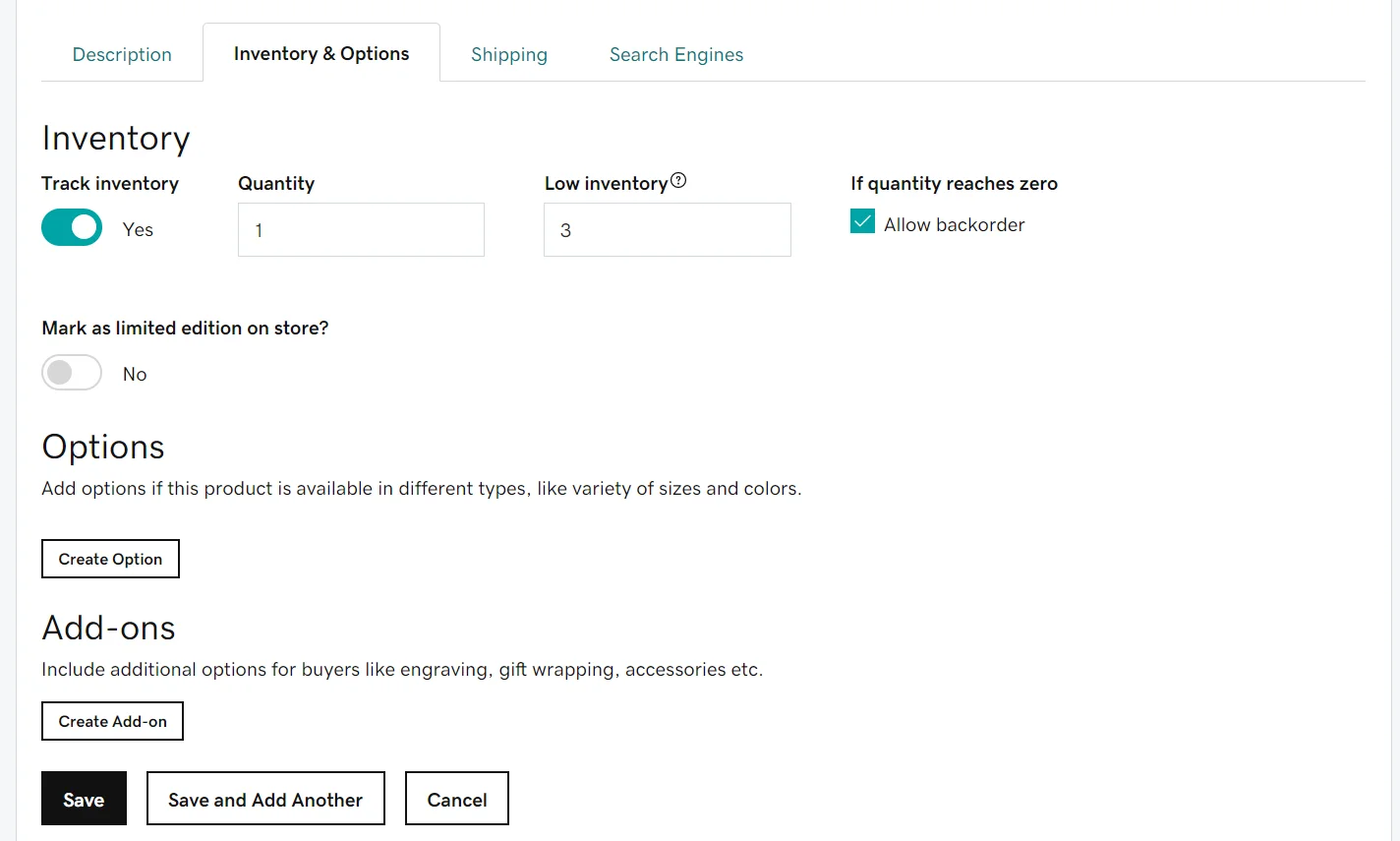
The verdict:
When it comes to inventory management, Shopify offers more advanced features compared to GoDaddy. While GoDaddy Shopify platforms provide basic inventory management capabilities, such as tracking and updating inventory levels, Shopify's features are more comprehensive and tailored to the needs of eCommerce businesses.
Payment Gateways
While Shopify wins in terms of stock control, what about payment aspects? Which is better GoDaddy or Shopify? Let’s break down this factor to help you choose!
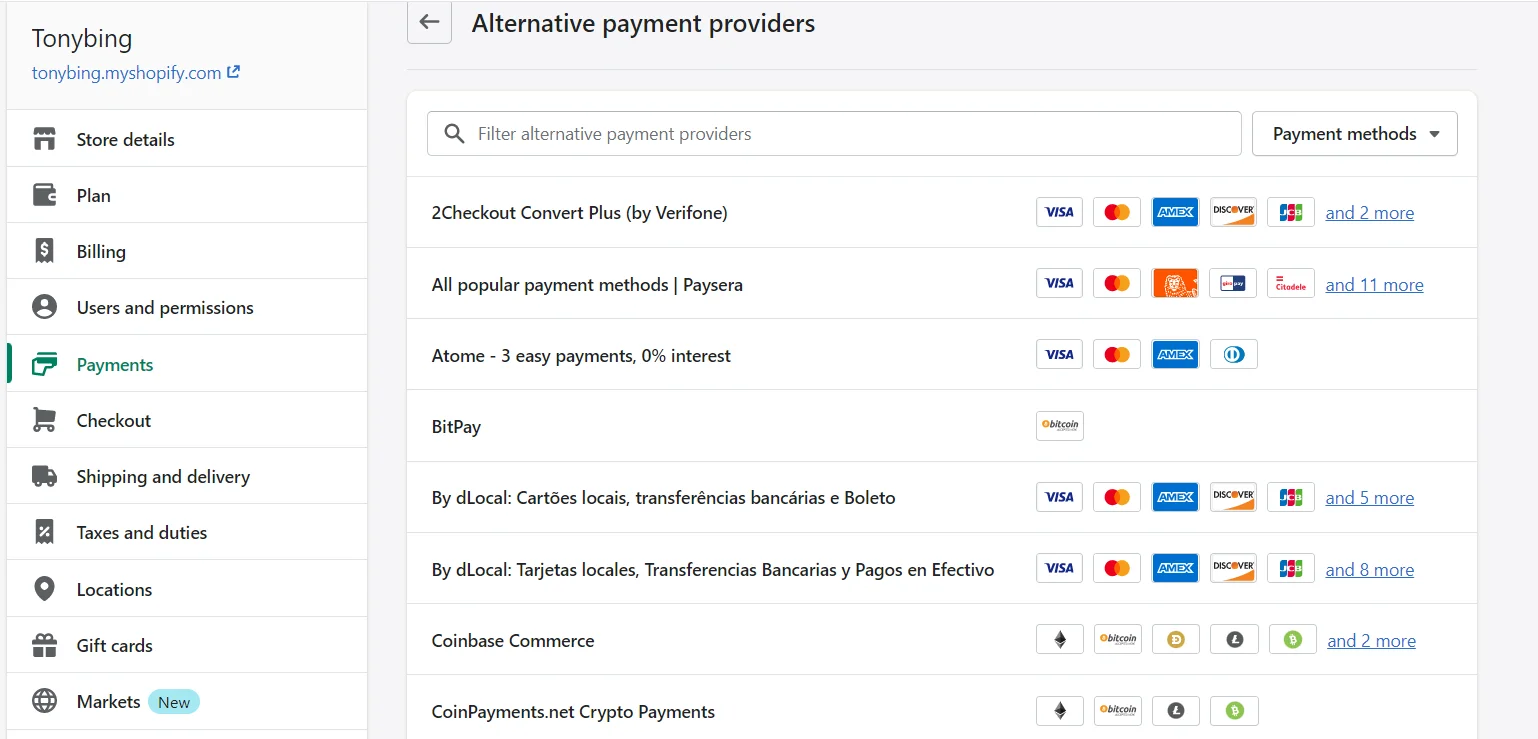
Offering a variety of payment methods allows businesses to reach more customers, which can lead to increased sales. Therefore, it’s beneficial for your platform to support multiple payment options and keep transaction fees low. Shopify supports a wide array of over 100 payment gateways, such as PayPal, Stripe, Amazon Pay, ApplePay, and even options like cryptocurrency and cash on delivery.
However, if you don’t use Shopify Payments, you’ll incur transaction fees for all other gateways. This means you’ll only have to cover the standard credit card fees set by the card companies. For more details on Shopify Payments, take a look at our detailed article.
What should be the GoDaddy vs Shopify comparison in this regard? As for GoDaddy, it’s doing quite well with payment gateways. It offers 3 main options: PayPal, Stripe, and Square, and also allows for Apple Pay through Stripe.
GoDaddy applies transaction fees for payments processed via their service, GoDaddy Payments. These fees include 2.5% + 0¢ for in-person transactions, 2.7% + 30¢ for online transactions, and 3.5% + 0¢ for keyed-in transactions.
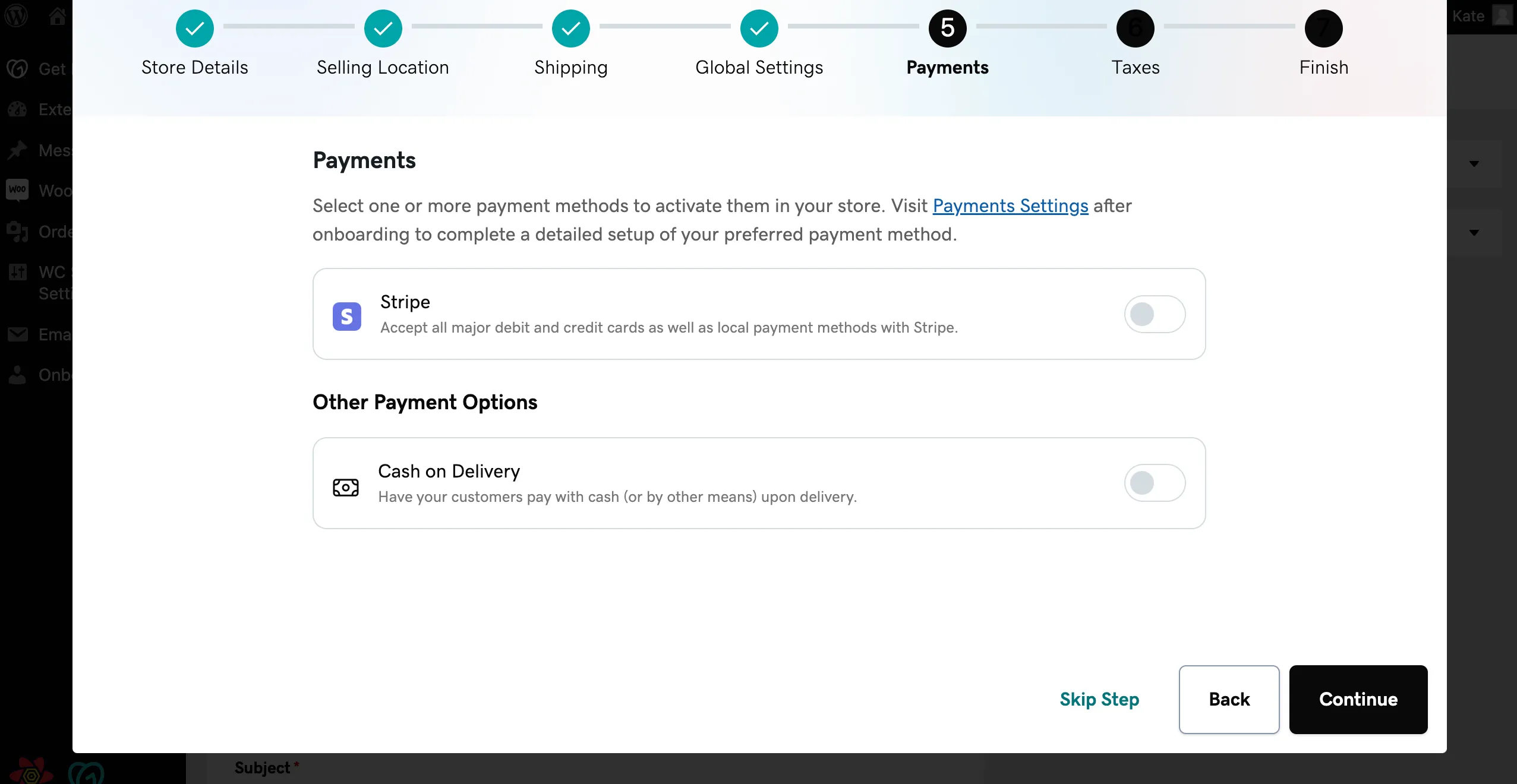
The verdict:
Shopify is the winner. It supports over 14 different payment methods, including various digital wallets. Meanwhile, GoDaddy has fewer payment options.
Reporting and Analytics
In this GoDaddy vs Shopify battle, it’s worth noting that Shopify’s analytics and reporting tools give you a window into your store’s operations, helping you understand your visitors, check your online store’s performance, and track sales.
Everyone has access to the Analytics page and key financial stats. If you run an online store, you can also use Live View. If you’re on the Basic Shopify plan or higher, you’ll unlock even more detailed reports.
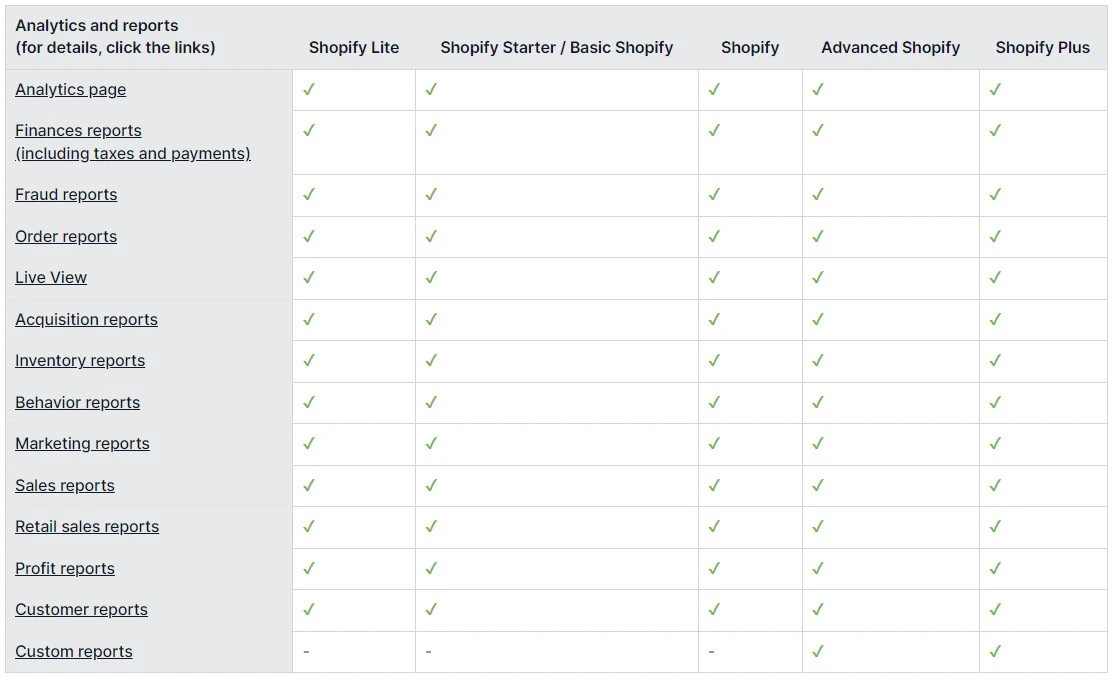
The dashboard and reports typically satisfy most store owners’ needs for monitoring and analysis. However, if you want to dive deeper or handle your data skillfully in other ways, you can export it to a spreadsheet program using third-party apps or analytics services.
Meanwhile, GoDaddy Insight serves as an all-in-one data hub that’s included in your site builder. It analyzes your business sector and offers tailored advice to maintain and improve. Plus, you can integrate Google Analytics to monitor your website’s performance.
The verdict:
Either GoDaddy or Shopify offers valuable insights, but Shopify’s scalability and detailed reporting might be more suited for businesses with growth in mind. So, Shopify wins.
Shipping
When you compare GoDaddy vs Shopify, you’ll find that Shopify seamlessly integrates your physical store, online Shopify presence, and social media platforms, ensuring consistent inventory management. This means you’ll instantly know if you can fulfill an order as soon as it’s placed.
Shopify has also streamlined the shipping process by partnering with prominent carriers such as USPS, DHL Express, UPS, and Canada Post. You’ll have the convenience of printing your shipping labels to speed up the process and tracking shipments directly from your site.
On the other hand, GoDaddy’s shipping integration is limited to UPS, USPS, Shippo, and DHL. It offers various shipping options, including flat-rate, weight-based, or complimentary shipping. Plus, GoDaddy provides the flexibility for customers to opt for in-store pickup if they are within the local vicinity.
The verdict:
When weighing GoDaddy vs Shopify, it’s clear that Shopify excels thanks to its comprehensive solution for eCommerce. In contrast, GoDaddy provides basic functionalities.
Omnichannel Selling – POS
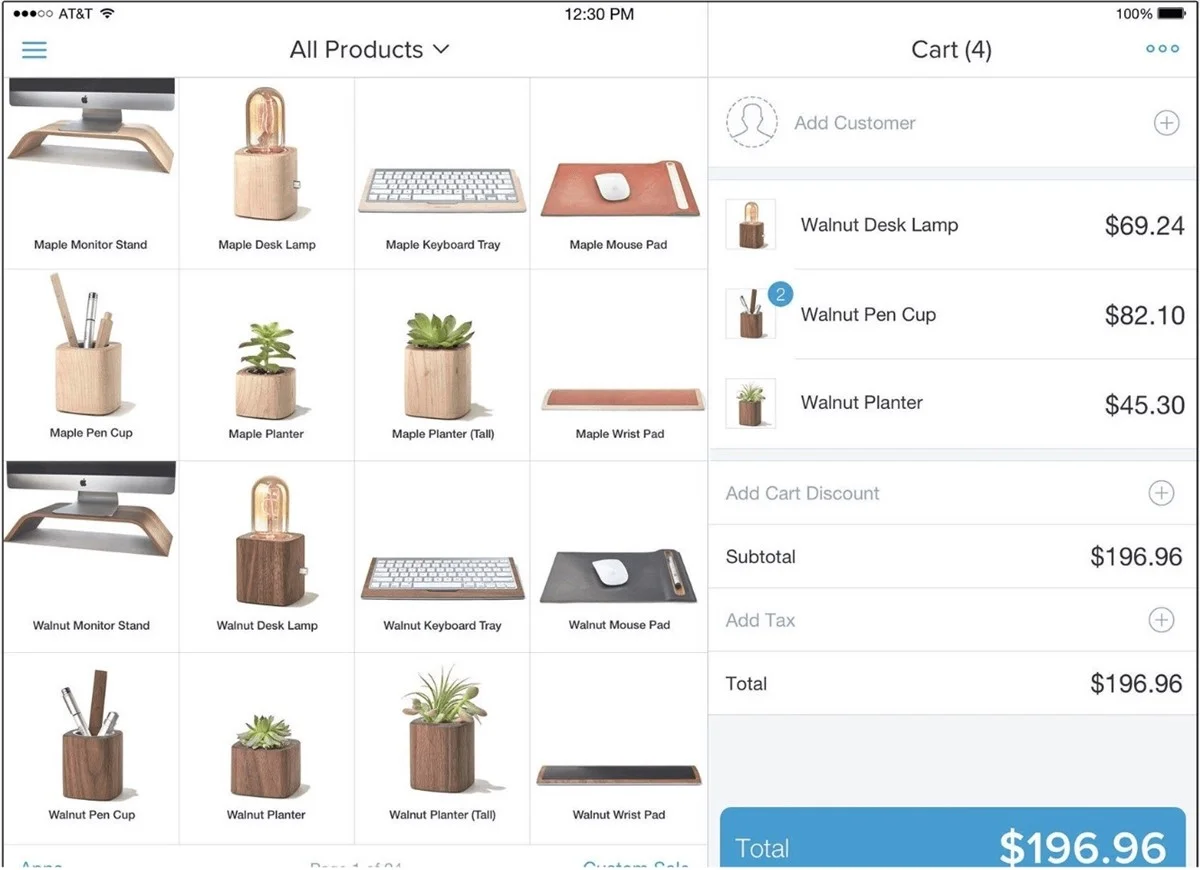
When comparing Shopify vs GoDaddy for omnichannel selling, you can learn that Shopify wins. Shopify is good at delivering a unified shopping experience for your customers. More specifically, the customers will have no difficulty switching between phones, computers, or even the purchases they get in-store.
What’s more, Shopify's POS system seamlessly integrates online and brick-and-mortar stores. That means you can track inventory more easily and create a consistently happy customer experience.
GoDaddy, on the other hand, lacks the features you need to link multiple touchpoints into an omnichannel experience. If you aim to provide a seamless shopping journey across channels, you may not want to go with this choice.
The verdict:
In terms of omnichannel selling, Shopify outshines GoDaddy with its robust features and capabilities.
Dropshipping & POD
Dropshipping
After doing some research, I can tell that the main difference in dropshipping capabilities between GoDaddy vs Shopify lies in Shopify’s dedicated approach.
Shopify has a vast app store with hundreds of dropshipping integrations like Spocket, Printful, Dsers and more. This makes tasks such as inventory management and ordering easier.
In contrast, GoDaddy doesn’t have built-in dropshipping tools. It’s technically feasible to process orders and deliver them manually to suppliers. Yet, this approach can be complicated. It requires frequent inventory updates and it might latent potential errors.
The verdict:
Shopify provides robust tools and integrations for managing dropshipping suppliers and automating order fulfillment. This makes it an ideal choice for entrepreneurs in the dropshipping space
POD
Ever dreamed of selling your own branded t-shirts or tote bags without the hassle of buying them in bulk? Print-on-demand (POD) may be a game-changer for creative folks like you.
Think of it this way: POD lets you design and personalize everyday items, like hats or bags, and then sell them under your own brand. Here's the best part: you only pay for the items that actually sell. This should eliminate the risk of getting stuck with leftover inventory.
POD services work seamlessly with various platforms to allow you to get started. For example, Printful offers seamless POD integration for Shopify stores.
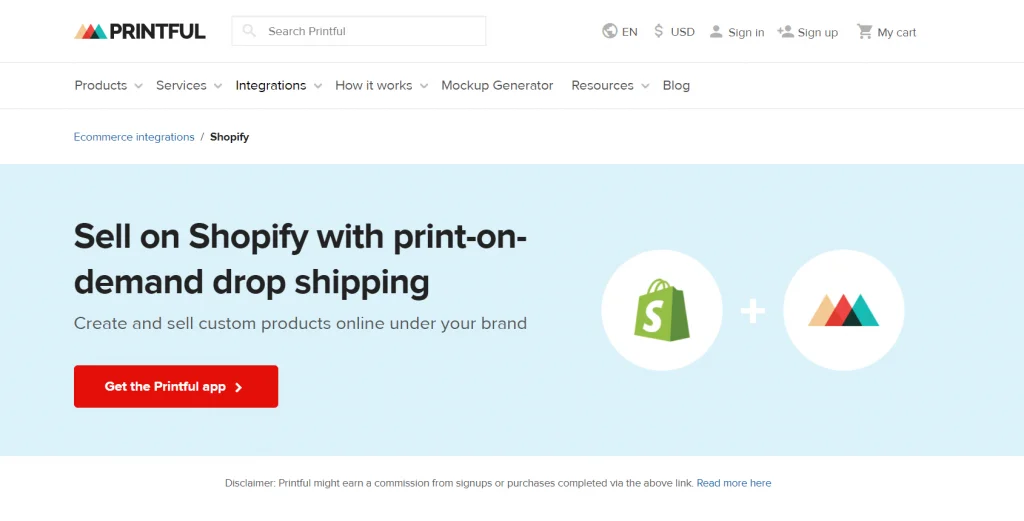
Meanwhile, GoDaddy doesn't integrate directly with Merch by Amazon (Merch38) for POD specifically. The good news is that GoDaddy's open API allows integration with various third-party fulfillment services that might connect with Merch38 or similar POD providers.
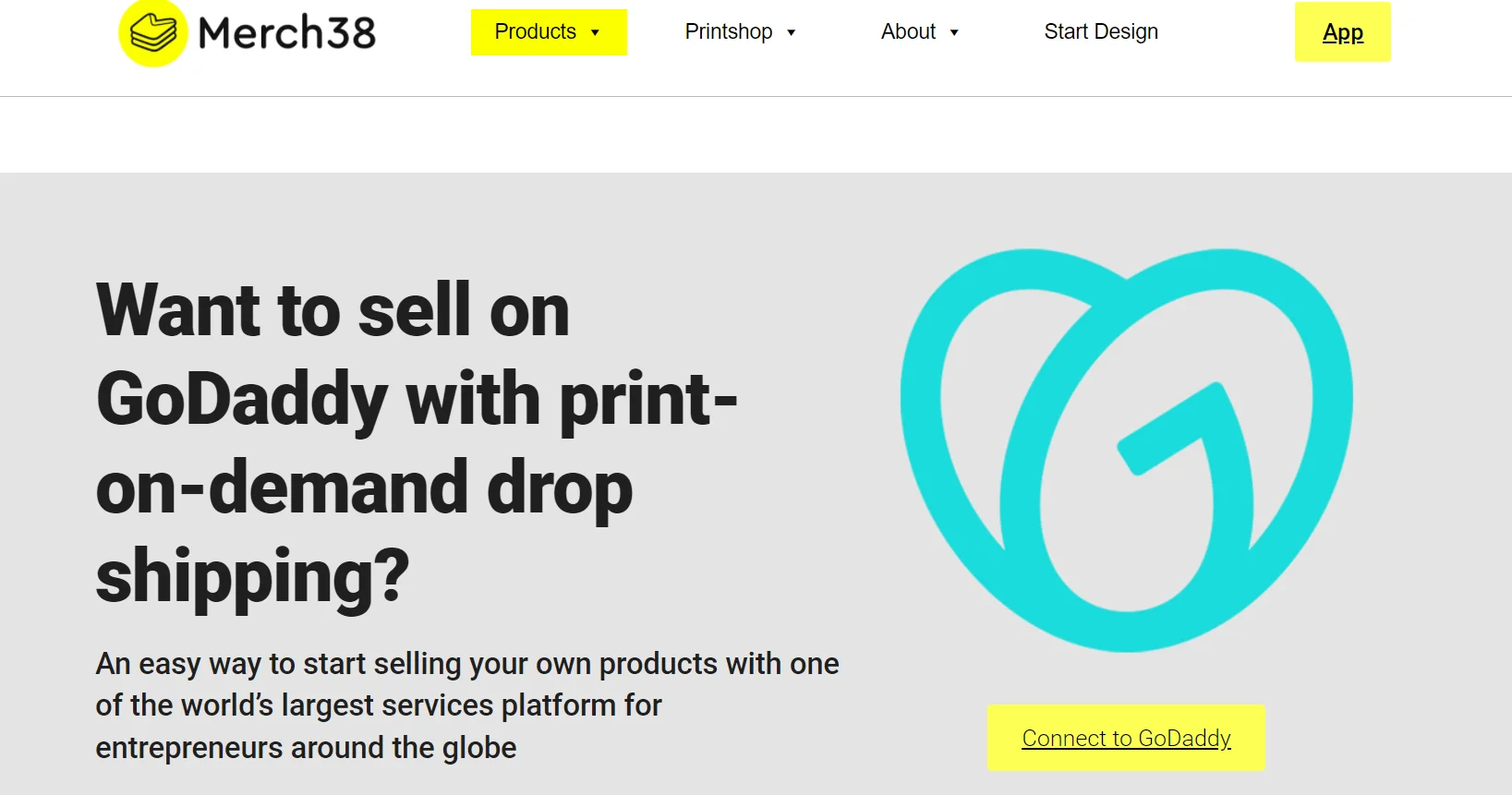
The verdict:
Shopify wins. It’s directly suited for POD.
Marketing Capabilities
Even if you create the world’s most creative and attractive online store, without the right marketing tools, potential customers may remain unaware of it. Now, let’s examine and contrast the marketing capabilities of GoDaddy vs Shopify.
Email marketing – Abandoned cart recovery
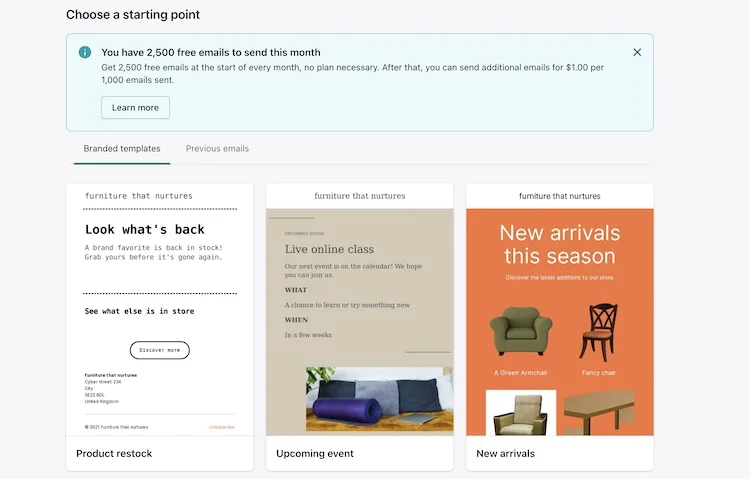
Is GoDaddy or Shopify better in terms of email marketing for abandoned cart recovery? Both platforms offer in-house email marketing solutions. Shopify allows sending up to 2,500 emails per month for free, with additional emails costing $0.001 each.
On the other hand, GoDaddy doesn't offer any free email plans anymore. Their previous free email option has been discontinued and they've switched to paid plans through Microsoft 365.
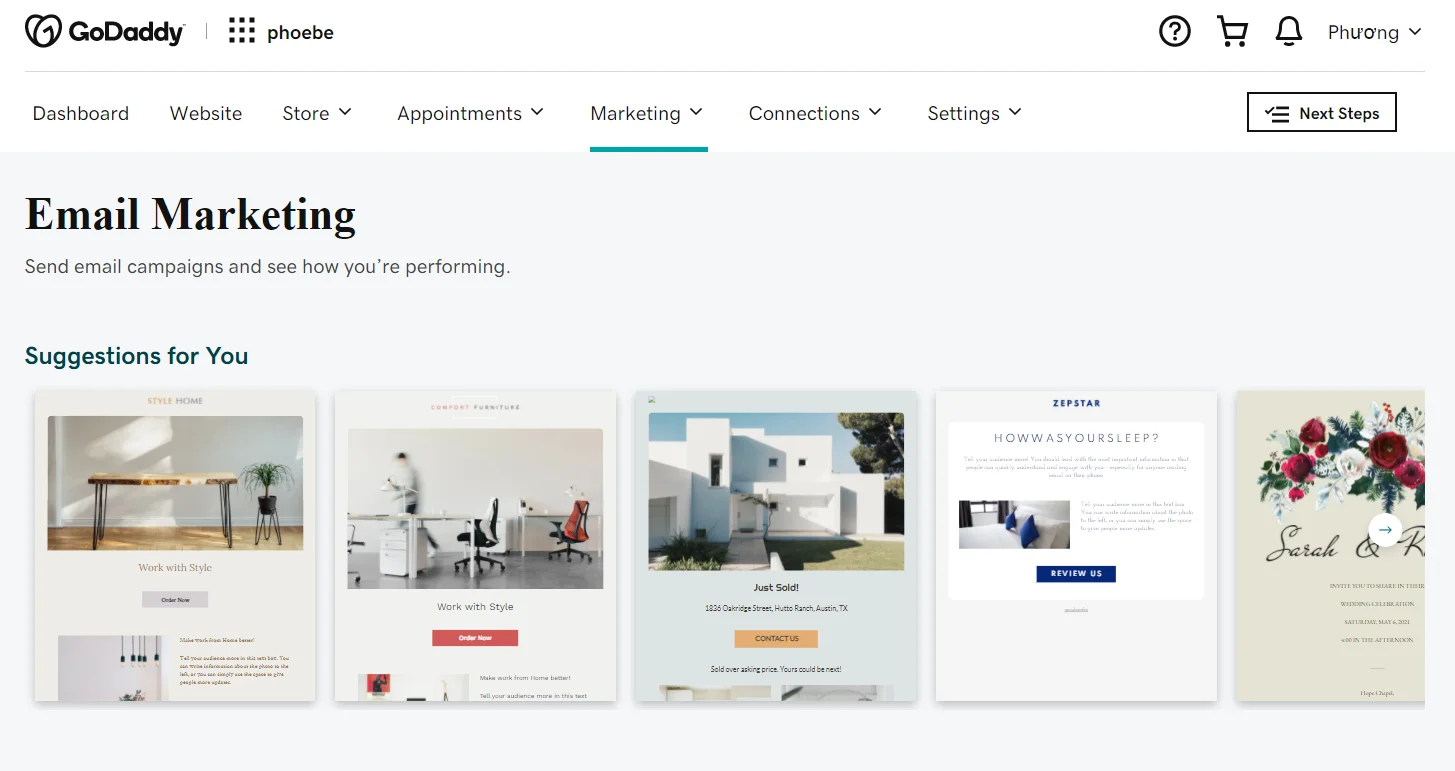
Both GoDaddy Shopify platforms provide convenient, easy-to-use, and free email marketing tools with pre-designed templates for various purposes like announcements and promotions. GoDaddy's email marketing tool is integrated with the account, offering templates, a stock photo library, and a WYSIWYG editor for creative freedom.
The verdict:
Both Shopify and GoDaddy excel in providing user-friendly and cost-effective email marketing solutions.
Blogging and Content
When comparing GoDaddy vs Shopify, you can see that both of them offer built-in blogging tools. This can help with SEO because blogs attract readers with valuable information and boost your online presence.
Shopify offers a built-in blogging platform. You can create and manage posts. Also, you have the option to make small adjustments, such as modifying metadata, titles, and descriptions. While it’s basic, it effectively accomplishes the task.
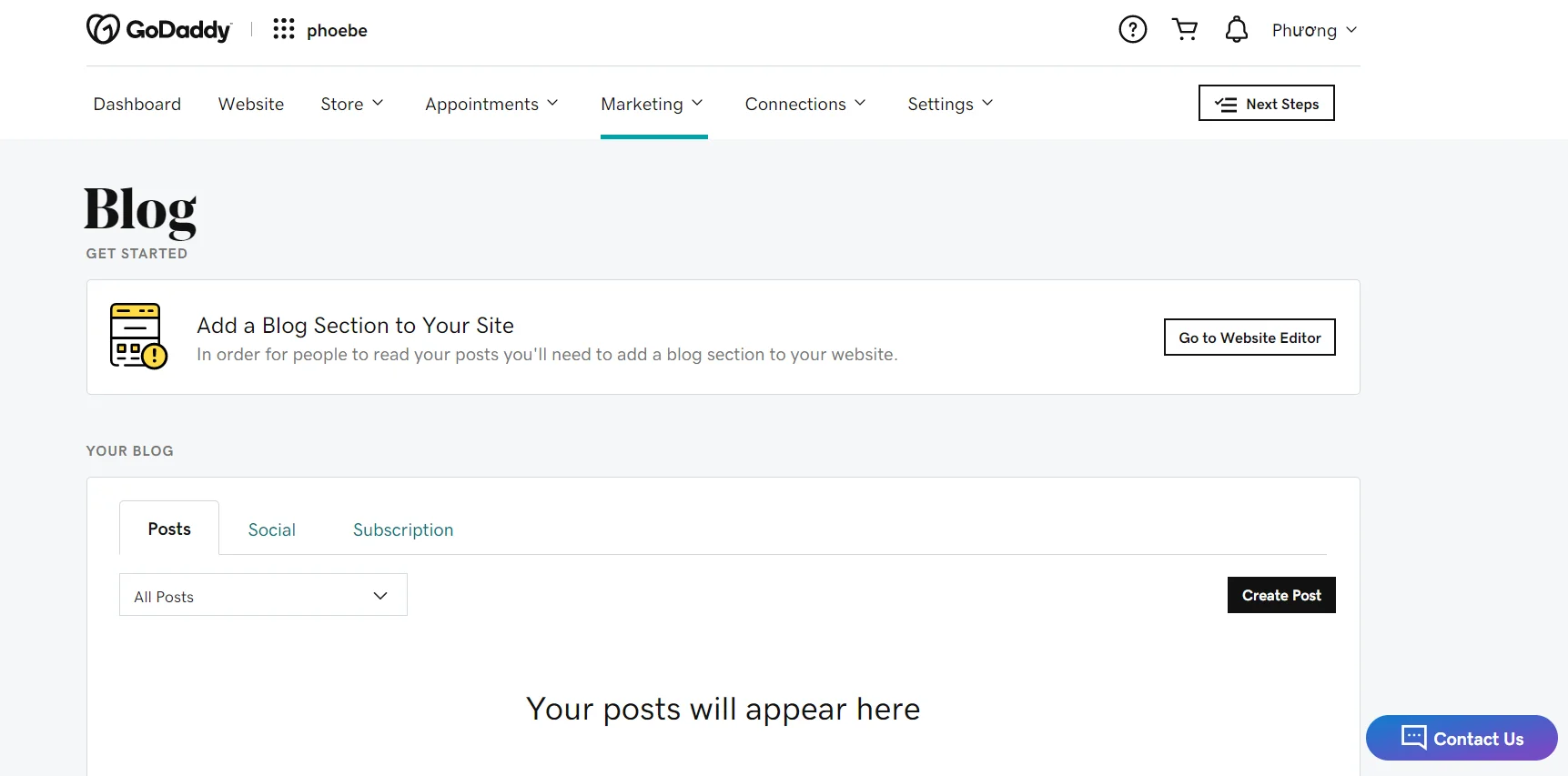
GoDaddy's blogging features are even more straightforward. You can effortlessly create and manage posts without the need to modify metadata, titles, or descriptions. Plus, GoDaddy provides professional templates through GoDaddy Studio for creating branded content for social media channels, including an instant video editor for boosting social engagement on platforms like Instagram and TikTok.
The verdict:
It’s a tie in this GoDaddy vs Shopify competition. They maintain simplicity and user-friendliness while covering the essential features, which is advantageous.
SEO
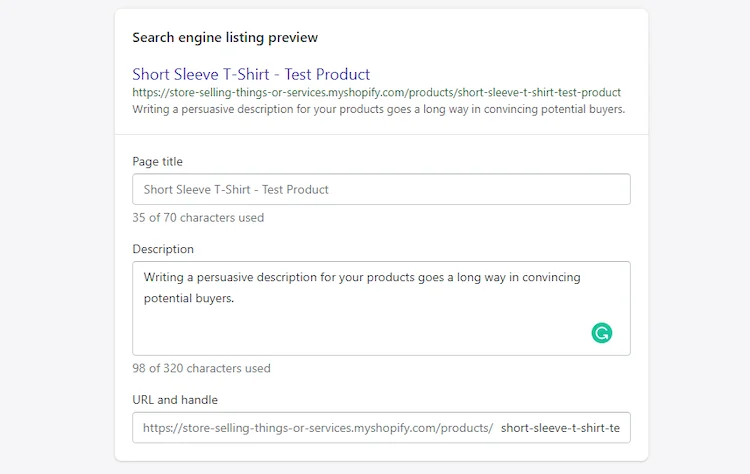
Shopify’s SEO tools cover the basics, allowing you to tweak titles and meta descriptions, along with providing a glimpse of how your site might appear in search results. It’s straightforward enough for beginners or those who need just the essentials. But for more in-depth SEO control, you might find Shopify limiting unless you explore its range of SEO apps, which can get expensive.
GoDaddy, in comparison, offers a keyword-centered SEO tool that monitors rankings as well. It also provides managed SEO services. In these services, you get a dedicated account manager for consultations and reports, but content creation isn't included. Their pricing is attractive but may lack depth due to the low cost.
While it helps you avoid doing SEO yourself, GoDaddy might neglect important aspects like mobile optimization and technical SEO, and their approach might be too general for your specific needs.
The verdict:
The comparison between GoDaddy vs Shopify highlights that Shopify handles basic SEO and relies on external apps for more advanced needs, while for GoDaddy, consider it for basic help if you have a tight budget. Overall, it’s a tie here.
Internationalization
Internationalization features in either GoDaddy or Shopify play a crucial role in expanding businesses globally. They are essential for catering to diverse markets and maximizing opportunities.
Languages
When you compare the difference between Shopify and GoDaddy, Shopify stands out for supporting multiple languages. It allows users to sell in up to 20 languages, with the option to translate their store into 50 languages and convert pricing to over 133 currencies. This feature is particularly useful for businesses looking to expand globally, as it enables them to cater to a broader customer base.
On the other hand, GoDaddy doesn’t offer a multilingual option, which can be a significant limitation for businesses that need to operate in multiple languages. This lack of support for multiple languages may make GoDaddy less suitable for businesses with international ambitions.
The verdict:
Shopify's language support is a key advantage over GoDaddy, making it a more suitable choice for businesses that need to operate in multiple languages or cater to a global customer base.
Want to migrate from GoDaddy to Shopify?
You are intending to migrate from GoDaddy to Shopify? LitExtension offers a great migration service that helps you transfer your data from the current eCommerce platform to a new one accurately.
Currencies
Enhancing sales by displaying costs and allowing customers to check out in their local currency is crucial. However, on a GoDaddy store, your currency display options are limited. While GoDaddy supports 18 different currencies, you can only use one on your website, which isn’t ideal for selling in diverse markets.
Yet, if you’re based in the U.S. and utilize GoDaddy’s marketplace integrations, international sales become feasible. GoDaddy seamlessly integrates with platforms like Amazon, Etsy, eBay, Facebook, Google Shopping, and Walmart. When your items appear in these markets, they automatically display in the visitor’s currency.
In comparison, Shopify’s multi-currency functionality, while not flawless, surpasses GoDaddy’s. First, you can add a ‘country selector’ to your Shopify theme, allowing customers to switch to their preferred currency. Second, the Shopify app store offers a free ‘geolocation’ app that adjusts currency based on IP address data.
Lastly, for fully automated currency conversion, third-party apps come to the rescue. For example, with the Bold Multi-currency app, customers don’t need to change their currency manually; your store adapts based on their IP address.
The verdict:
In the battle of GoDaddy vs Shopify for multi-currency selling, Shopify emerges as the winner.
Tax
Regarding tax, Shopify outperforms GoDaddy in automatic tax computation. Shopify offers automated tax calculations for users in the U.S., the EU, the UK, and Canada, saving time and effort for merchants.
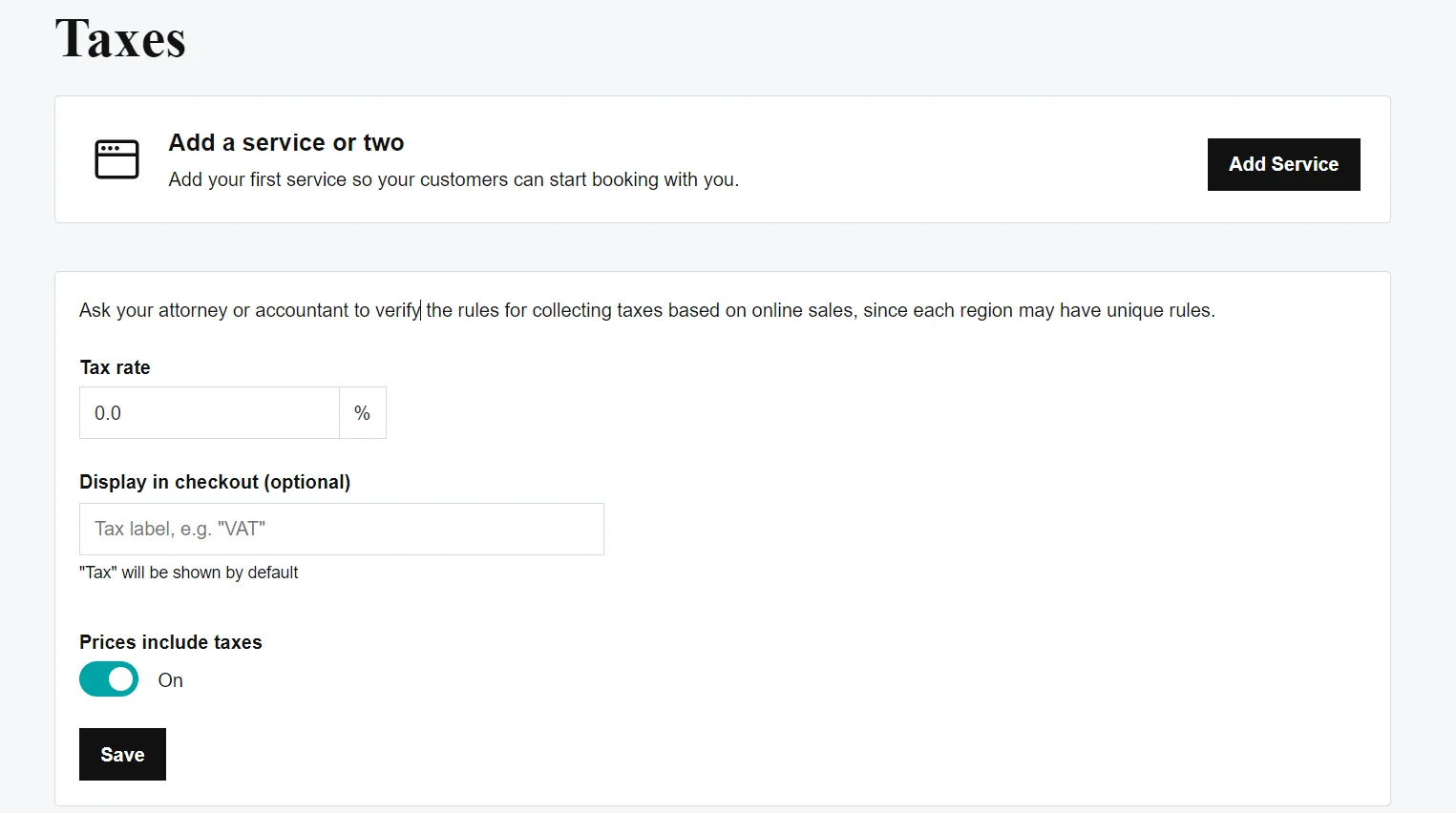
In contrast, GoDaddy requires a manual setup of sales tax for each product, which can be time-consuming. Specifically, in the EU, where digital goods are subject to VAT MOSS, Shopify simplifies the computation with its ‘Digital Downloads' tool, while GoDaddy lacks such streamlined functionality, requiring manual input of tax rates for each EU country.
The verdict:
Shopify's automated tax calculation feature provides a distinct advantage over GoDaddy in terms of tax management for online merchants.
Security
Shopify security
Thanks to its hosted nature, Shopify takes care of all upgrades and security concerns in the background, making it a safe platform. The Shopify system is hosted on a Level 1 certified server, a requirement for processing credit or debit card information. Additionally, every Shopify store features SSL encryption at a 156-bit rate to protect customer data.
Shopify also provides merchants with SOC (Service Organization Control) and Transparency reports, which are assessments by third-party auditors.
As a result, Shopify merchants must adhere to a set of independent guidelines, which include security and service availability requirements.
GoDaddy security
Standard plans come with basic security features like fraud, virus, spam protection, email privacy, and protection. If you need more, you might have to buy more security plans to get, which might be costly to merchants.
GoDaddy provides GoDaddy Website Security to scan merchants’ websites for potential security-related problems like pharmaceutical hacks, redirect hacks, backdoor file hacks, Trojan viruses, and so on. When Website security catches an issue on the site, GoDaddy will notice store owners immediately. At the same time, it brings about the next steps to fix them.
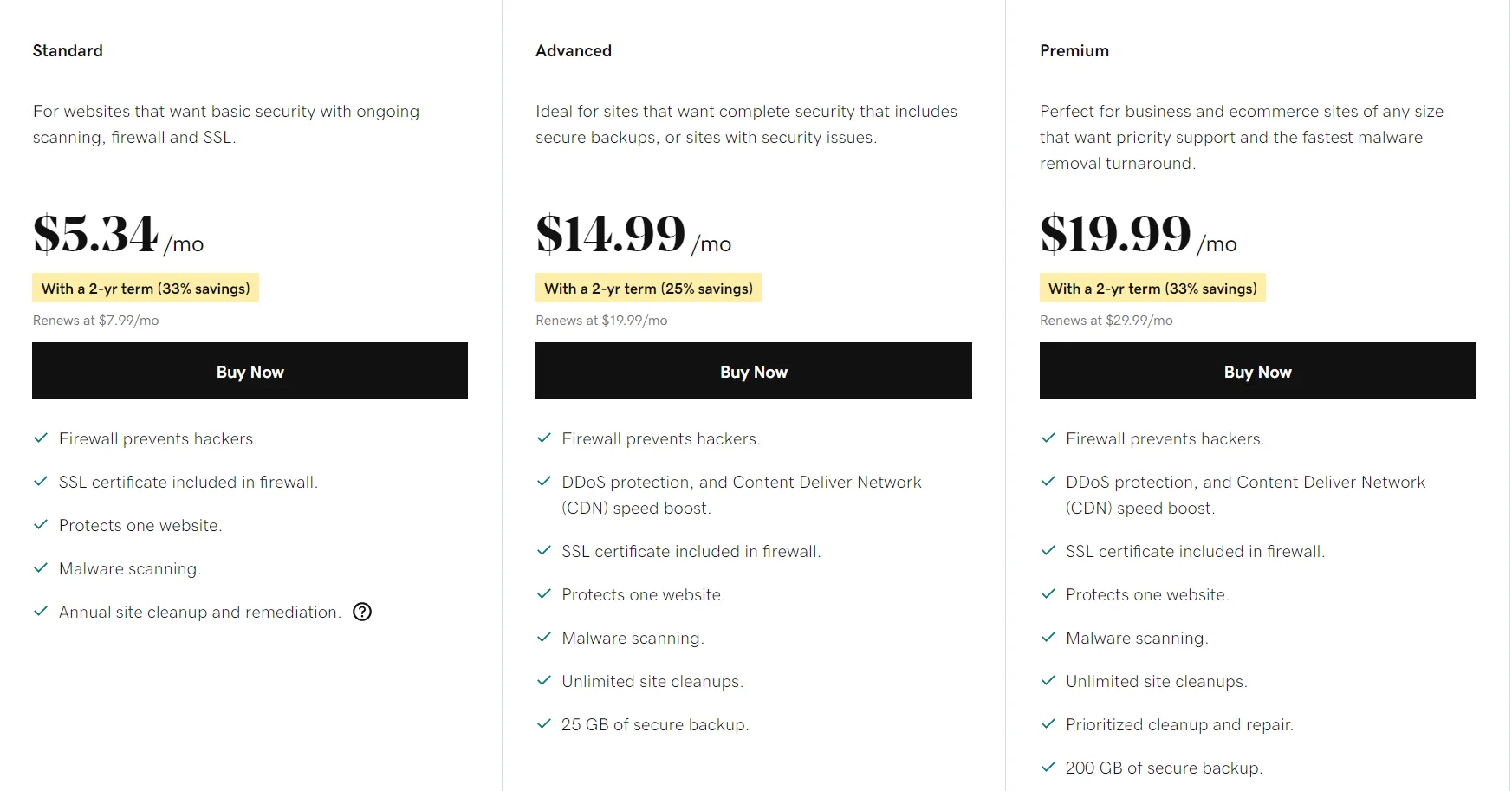
Secondly, GoDaddy Security also provides Website Backup which enables merchants to back up their site and related database via FTP or SFTP to secure cloud location. During the backup, GoDaddy will scan your files for malware and then store the malware-free copies for safe storage. Backups start immediately when merchants set up their accounts.
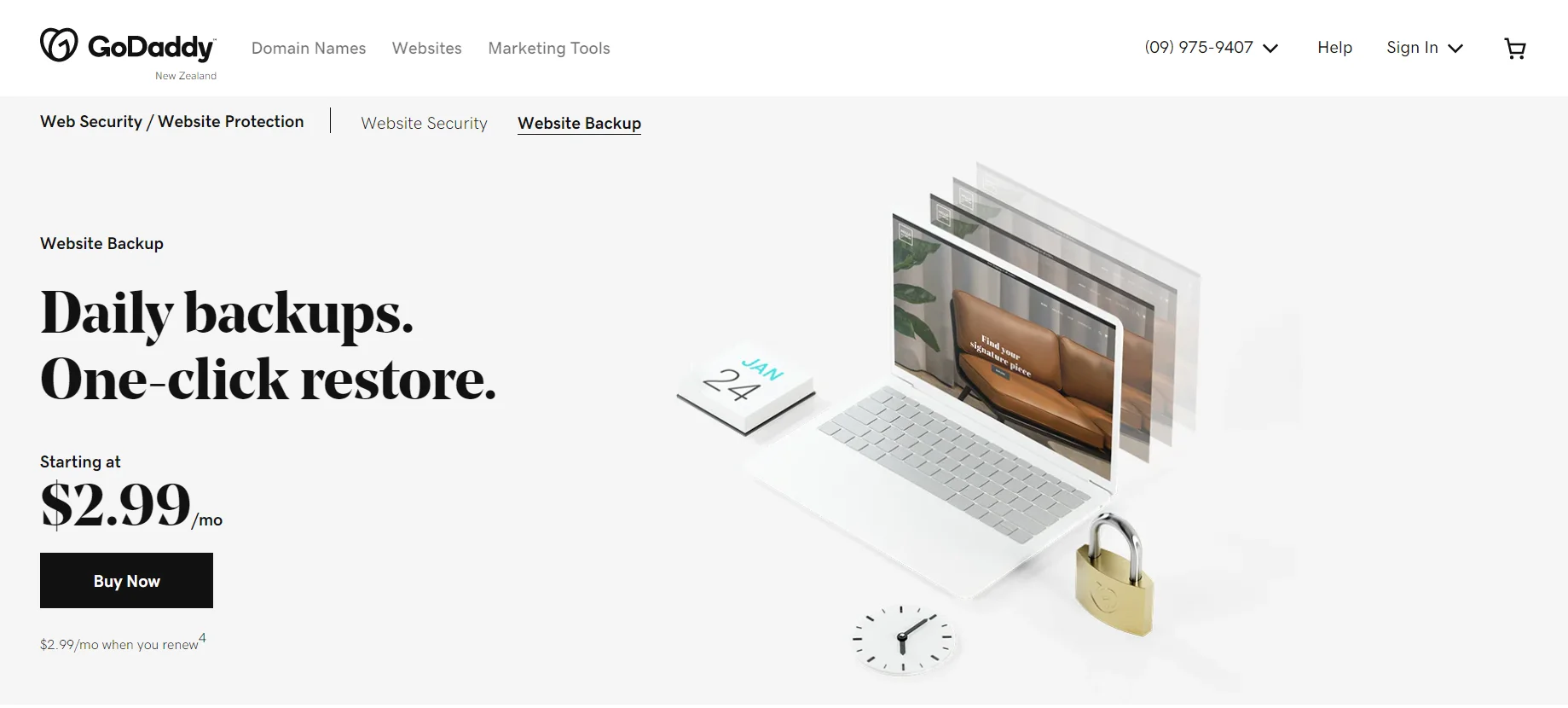
The verdict:
As GoDaddy comprises only the most basic features, merchants will have to pay for the rest. Thus, regarding Shopify vs GoDaddy security, GoDaddy can be seen as a greedy shark. Clearly, Shopify takes the crown in this security competition.
Customer Support
Customer service is a vital aspect of creating a successful eCommerce empire since it keeps your online shop well-functioning, revenue flowing, and consumers pleased. But Shopify vs GoDaddy, which platform is the most beneficial?
Shopify pulls out all the stops once more. It offers 24/7 phone and live chat support, as well as email and social media support. Furthermore, there is a forum with +900000 members to assist you with any problems you may have. When you use Shopify, you'll never be left in the dark.
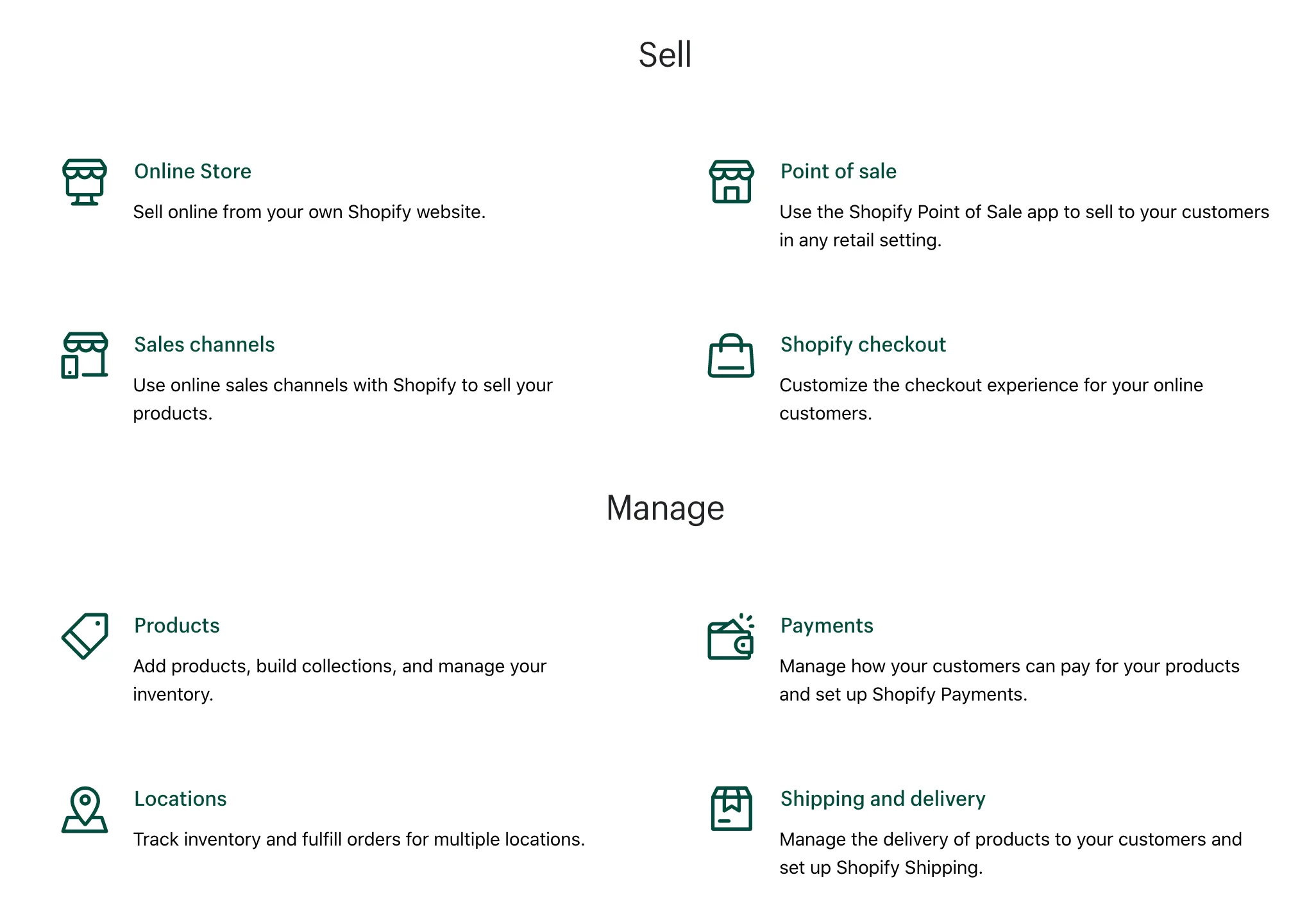
All of GoDaddy's plans include GoDaddy live chat and phone assistance. In most regions, phone support is available 24/7 (while live chat is available 24/7 in all). Finding the company's phone number is simple because it's listed under the ‘contact us' section in the main menu. GoDaddy also has a Twitter support account, as well as a variety of help center articles and video lessons.
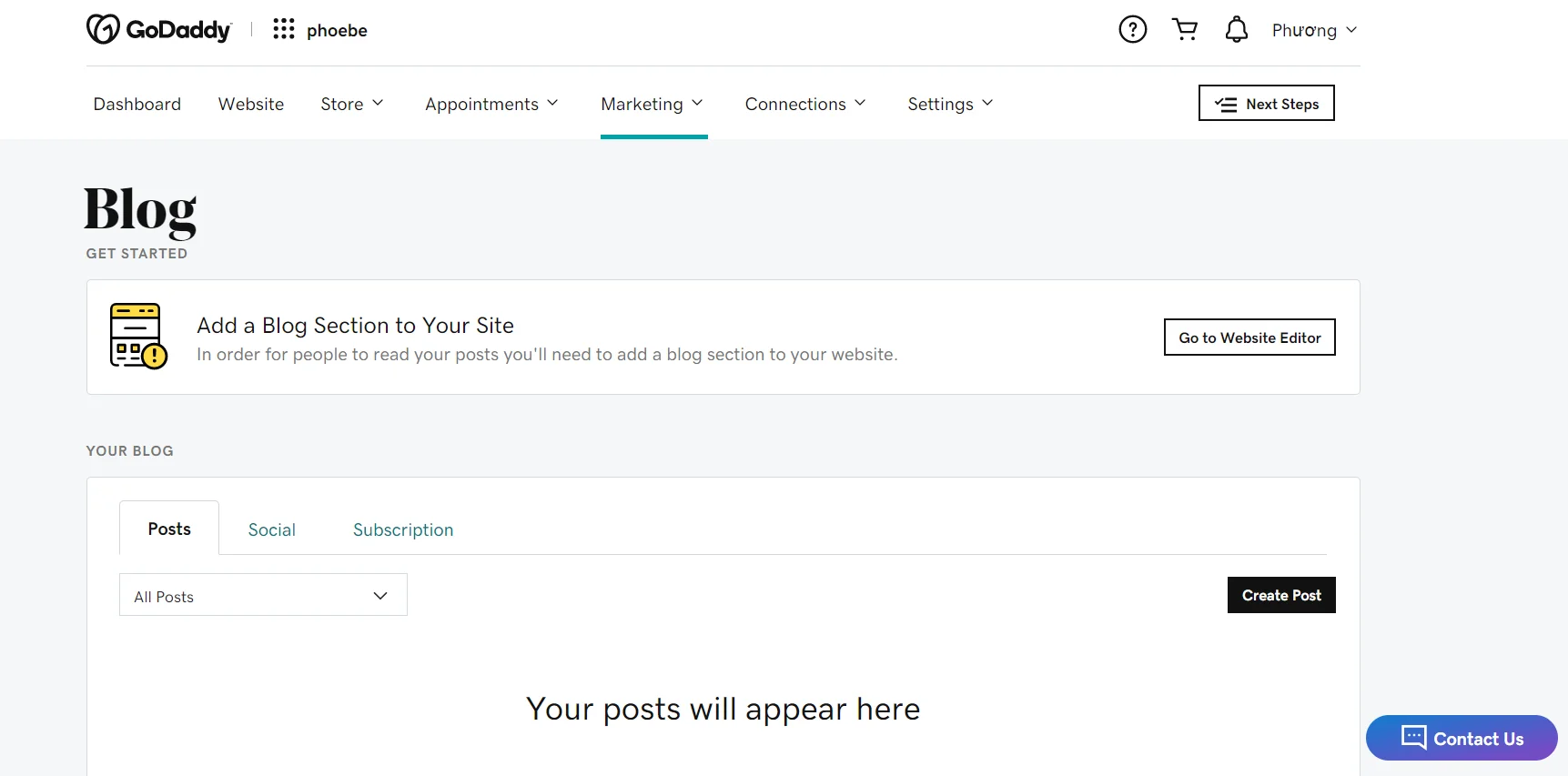
Finding the Shopify contact details for phone and email assistance is only accessible after you've looked for an answer in the help center search facility. As a result, GoDaddy is the most ‘contactable' of the two companies.
Finally, if you have an issue with your GoDaddy template, you can almost always obtain straight responses from the company's support team. However, this is not always the case with Shopify. You may need to contact the theme creator directly for help with many of its paid-for layouts.
The verdict:
Concerning customer support, Shopify vs GoDaddy, which one serves you more? Both Shopify and GoDaddy provide full assistance, GoDaddy is the more accessible of the two, while Shopify provides more channels.
Final Result: Shopify vs GoDaddy – Which Should You Use?
Considering all the criteria above, what conclusion can you reach? Which is better GoDaddy or Shopify?
The old advice that works is that choosing between GoDaddy vs Shopify depends on your needs and experience level. Shopify is better for those who want a powerful, scalable eCommerce platform with a wide range of features, including inventory management, marketing tools, and internationalization features. It also has a large app store that allows you to add even more functionality to your store. However, Shopify is also more expensive than GoDaddy.
GoDaddy is a better option for those who are just starting and want a simple, easy-to-use platform. GoDaddy eCommerce pricing is also more affordable than Shopify. However, it doesn’t have as many features as Shopify, and it can be more difficult to scale your store as your business grows.
Shopify and Godaddy Alternatives
When you’re considering alternatives to either Shopify or GoDaddy for eCommerce solutions, some options stand out for their unique features, pricing, and user experiences. Here we suggest 3 best alternatives:
1. BigCommerce
BigCommerce is a popular eCommerce platform known for its scalability, flexibility, and extensive feature set. It offers a wide range of customizable templates, integrations with various payment gateways, and robust product management tools.

BigCommerce is particularly suitable for larger businesses or those expecting rapid growth. Because it can handle high traffic volumes and large product catalogs.
Its pricing plans are competitive with Shopify, starting at $39/month, and it offers a 15-day free trial.
2. WooCommerce
WooCommerce serves as a plugin for WordPress, converting a standard WordPress site into a comprehensive eCommerce platform. It's highly customizable, with thousands of extensions and themes available. WooCommerce is ideal for businesses already using WordPress or those who prefer a high degree of control over their website's design and functionality.
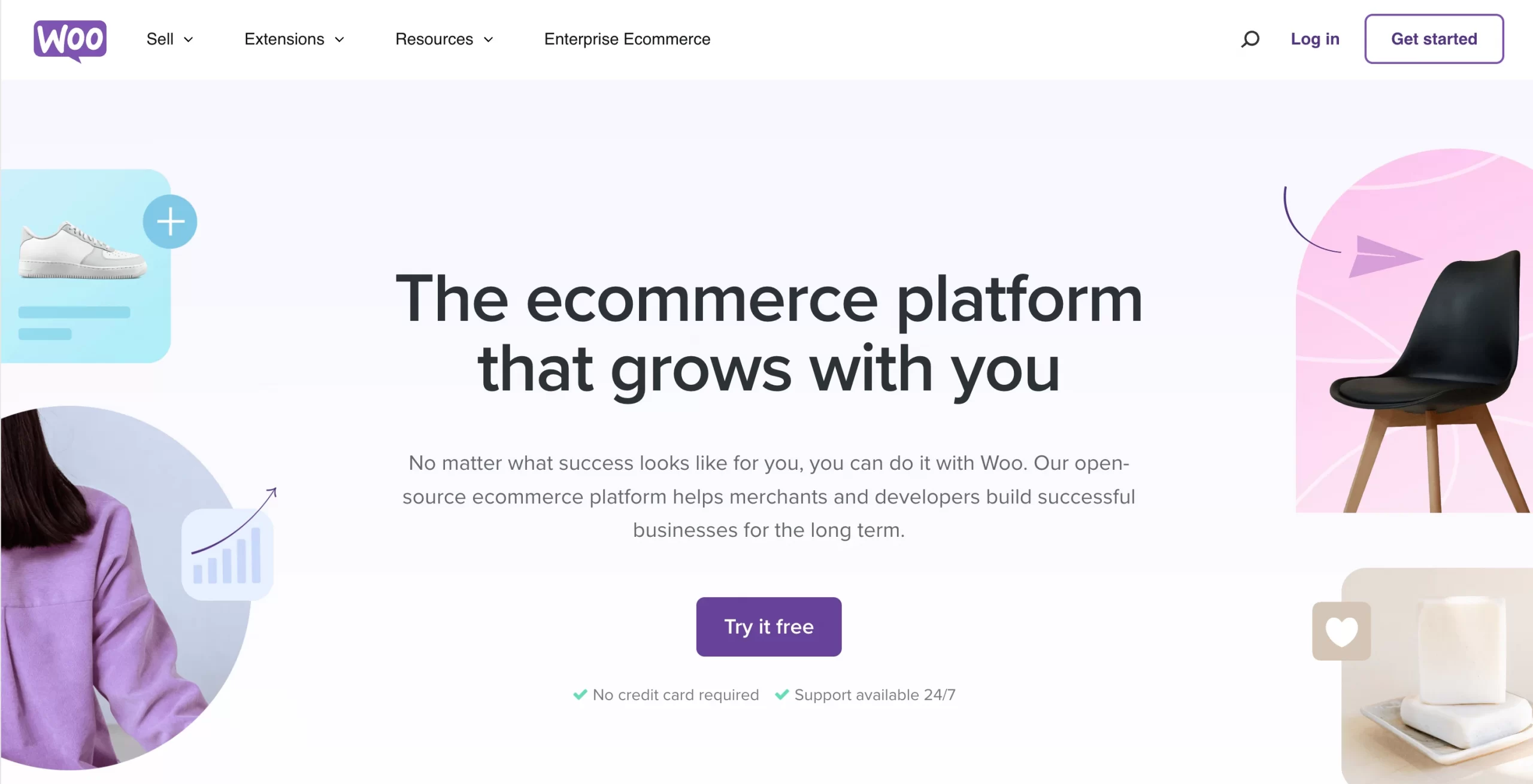
Its pricing is flexible, with a free core plugin and optional extensions and themes available for purchase. This makes it a cost-effective option, especially for smaller businesses or those with existing WordPress sites.
- Related post: Shopify vs WordPress: Which Should You Use?
3. Squarespace
Squarespace is a platform for creating websites that comes with built-in eCommerce capabilities. It’s recognized for its stylish, contemporary designs and intuitive user experience. Squarespace is suitable for businesses that prioritize design and ease of use. Its eCommerce features are integrated into its website builder, making it easy to set up an online store.

Pricing starts at $16/month (billed annually), and it offers a 14-day free trial. Squarespace is ideal for smaller businesses or those who want a visually appealing online store without the need for advanced eCommerce features.
- Related post: Shopify vs Squarespace: Which One Offers More?
Shopify vs GoDaddy: FAQs
Can you switch from GoDaddy to Shopify?
Yes, you can transfer your GoDaddy store’s content by copying it and then pasting it into your Shopify store. You can also export your data into CSV files and then import them into Shopify, although be aware that not all data may be transferable in this manner. Else, utilize LitExtension – #1 Shopping Cart Migration Expert.
Can GoDaddy and Shopify work together?
Yes, you can link your GoDaddy domain to your Shopify store. Do this through an automatic connection, which is a simple method recommended by Shopify. Alternatively, if you run into any issues, there’s also the option for a manual configuration.
What is the difference between Shopify and GoDaddy?
Here are the key differences between Shopify and GoDaddy:
- Shopify is solely focused on eCommerce, while GoDaddy offers a wider range of web services, including eCommerce.
- Shopify has more extensive eCommerce features, including marketing tools, abandoned cart recovery, and more, while GoDaddy's features are more basic.
- GoDaddy is generally easier to use than Shopify, but offers less advanced features and customization.
- Shopify is designed to scale with growing businesses, while GoDaddy is better suited for smaller stores or those just starting out.
Is GoDaddy good for selling online?
Yes, GoDaddy can be a good option for selling online if you:
- Have a smaller store;
- Need a simple setup;
- Already use GoDaddy for other services.
Conclusion
In the end, Shopify is the more powerful of the two platforms in a Shopify vs GoDaddy battle. Its broader set of selling tools allows you to establish a more complex, customized online shop. Other than that, its multilingual and multicurrency capabilities also allow you to extend your eCommerce business abroad in ways that GoDaddy cannot. GoDaddy, in contrast, caters mostly to solopreneurs and small company owners, Shopify serves a far broader spectrum of businesses.
But if you're a complete eCommerce newbie who only wants to sell online in one currency and language. Then, there's a case to be made for GoDaddy's user-friendliness, all-in-one nature, and lower price.
GoDaddy and Shopify are not the only eCommerce platforms available – there are many more Shopify alternatives which are worth considering! If you are considering switching GoDaddy to Shopify, LitExtension – #1 Shopping Cart Migration Expert is here to help! Our team will help you succeed in performing GoDaddy to Shopify migration perfectly! Please contact us, we are always here to help.
You may also like:
- Shopify vs Shopify Plus: 12 Key Differences to Consider
- Shopify vs Square: Price, Online Store and POS Features
- Shopify vs Amazon: Which Is Best For Selling Online?
- Shopify vs Custom-built Websites
- Shopify vs eBay – Comparing Key Features And Differences
- Shopify vs Salesforce Commerce Cloud: A Detailed Comparison
- Shopify vs Etsy: How Do We Differentiate?

